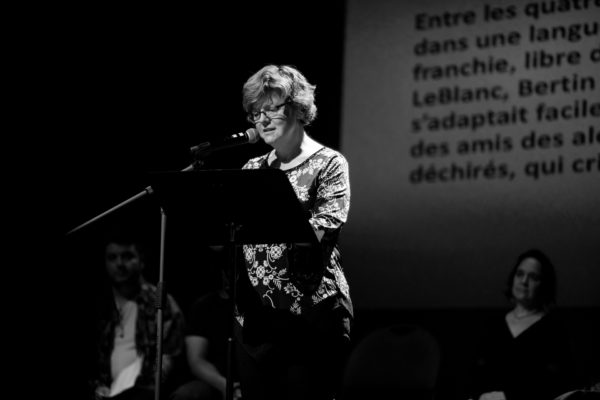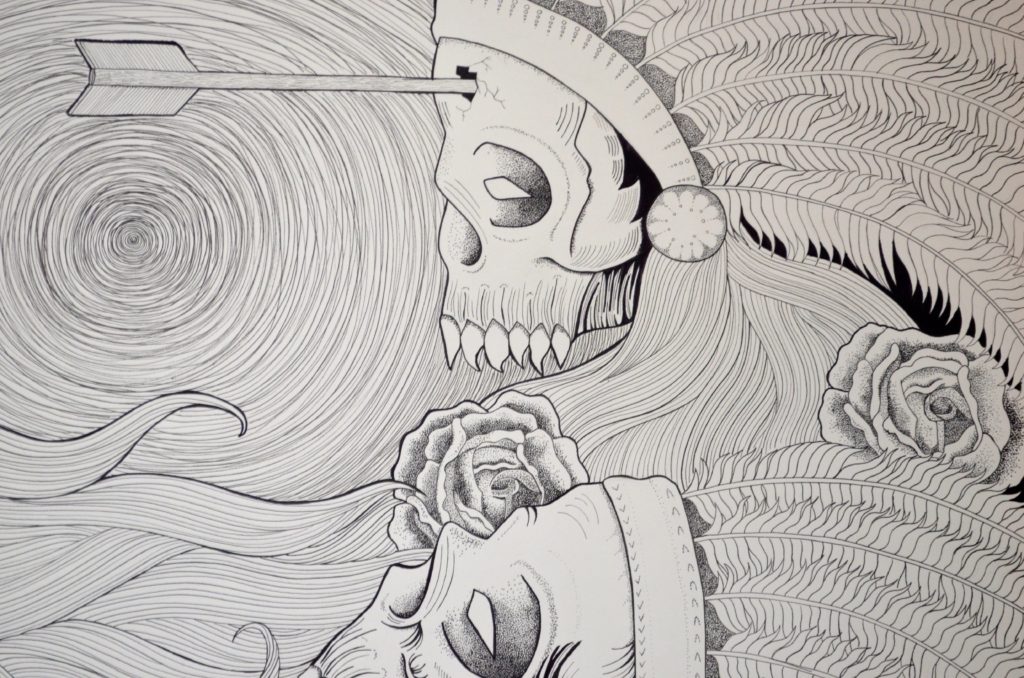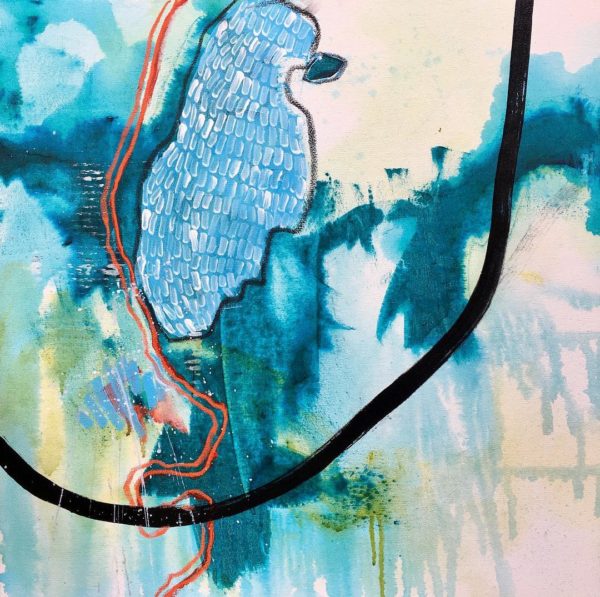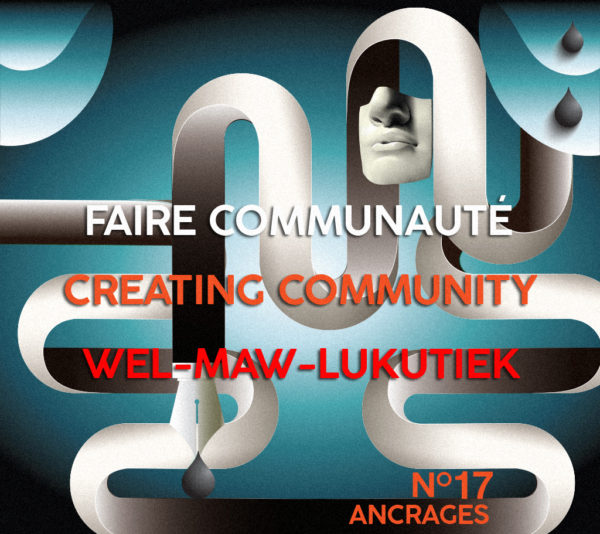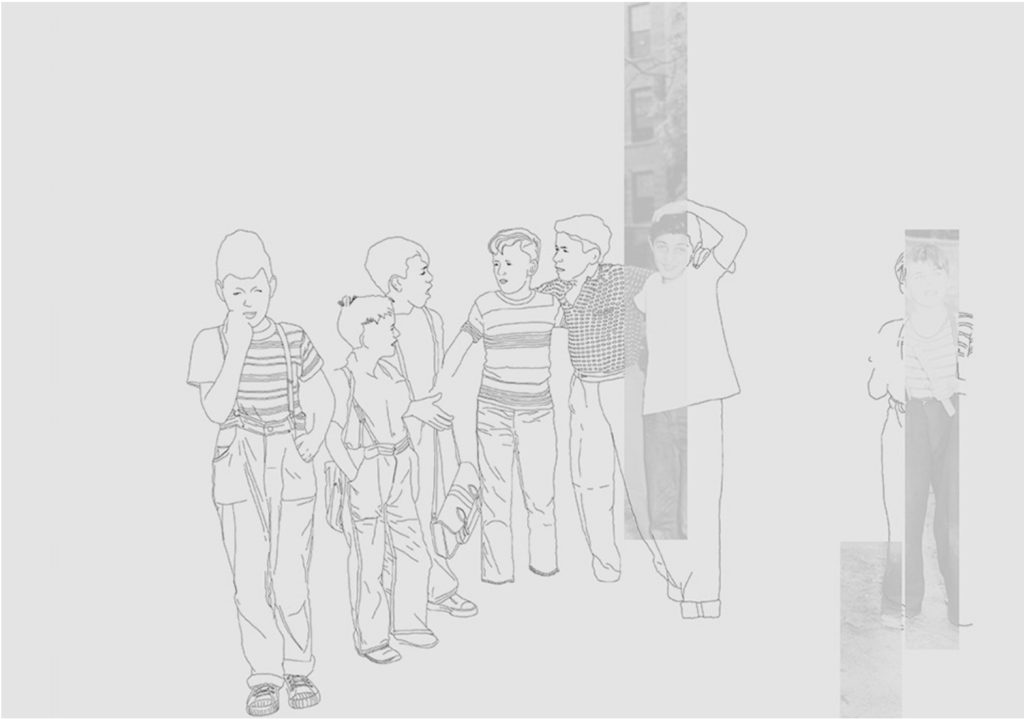
When you were a child, your mother sat on your bed, rested the palm of her hand between your shoulder blades, and asked about your day. You sat up and confided in her, shared your fears that never failed to swell in the dark. She comforted you, told you stories of her family farm in Ontario and taught you an Irish prayer to a guardian angel. Inside the walls of your house, you argued with your brothers in one language, and stepped out into another beyond the front door where you were free to run through a noisy neighbourhood populated with LeBlancs, Bertins and Bujolds. Having been christened with a pliable name, the transition went unnoticed by the neighbourhood friends who, hockey sticks and torn gloves in hand, called your name easily. They laced their skates on your front steps and took to the backyard rink, an icy surface your father flooded late into the night and beneath which the lawn never seemed to grow during the summer months. The French school was a child’s walking distance from your house. Mornings were spent conjugating verbs, on paper and out loud. You learned that nouns were gender specific, that the word for “beginning” is masculine and the one for “end” is feminine, and there was no reason to question it, because it seemed to make sense, because it sounded right. The teacher pointed to a large map posted above the wall-mounted pencil sharpener and explained that the Appalachian Mountains on the other side of the river were not part of Nouveau-Brunswick, but belonged to the province of Québec. After school, while walking home, you imagined the dotted line that ran unseen along the bottom of the riverbed.
Each summer, you and your brothers crowded into the green station wagon for the annual pilgrimage to la Péninsule Acadienne for the feast of La-Bonne-Sainte-Anne. Motion sickness has its privileges. While your brothers in the back seat elbowed each other, you sat up front between your parents to be nearer the empty one-gallon paint can stowed on the floor between your mother’s feet. Turning your eyes to the driver’s side of the car, you watched as the river widened and the ridgeline of La Gaspésie retreated into the horizon until all your eye could see was the blue motion of the bay framing your father’s profile. And in that very moment, you claimed the sea as an Acadian birthright : your father’s birthright, and therefore your own. You thought it funny when your father first pointed out his childhood home, because you had never thought of your father as a child. You were surprised when you saw your family name engraved on a polished plaque on the sanctuary grounds of Le Bocage. One year, on the return trip, your father pulled to the side of the road at the top of a hill near Pokeshaw. Bounding out of the car, you pushed your way through a thicket of fir and spruce and stumbled out onto a bluff. Your mother called out to you, warned you not to wander too far, not to stand to close to the edge. From your raised vantage point, you surveyed a flight of cormorants keening sorrowfully over the slow erosion of their small island. Pokeshaw. You liked the feel of the word in your mouth and the sound of it in your ear. Pokeshaw. As if it had a secret meaning that revealed itself only if repeated a certain number of times. Pokeshaw. You closed your eyes and inhaled, filled your chest with the seamless expanse of sea and sky, your young mind conjuring up your ancestor, Olivier à René, at the helm of a wooden ship, its sails billowing white in the wind.
The name of your village priest was Savoie. Mass was said in French, so was the evening rosary at home. God was fluent, but you suspected your guardian angel responded best to the English prayer you mother taught you.
When you were nine, a schoolyard friend grabbed you by the shoulders. Red-faced and dishevelled, he told you that the body of the kidnapped politician, the man named Laporte, had been found in the trunk of a car in Québec. The news frightened you. You saw the images at home on television, but couldn’t grasp the subtleties of the arguments or fully understand the anger. That night, looking out your bedroom window, Québec appeared worryingly close, the river too narrow, the Van Horne Bridge too accessible. If they came, you could slip into French, hide inside the language, change the “Z” in your name to “S” if need be. What had always been unquestioned and fluid seemed all at once precarious. The separation of a whole into two discrete parts would henceforth have to be carefully managed, lest you be found out and forced to choose.
You grew up and married a childhood friend whose mother, a Gaspésienne, had christened him with a handsome name that sounded French in both languages. Together, you left the river. You studied and worked in la Ville de Québec, where you learned how to disguise your rolling “r”s, and moved to Toronto, where omitting a breathy “h” drew side-glances of misplaced condescension. You learned the definition of “linguistic exogamy”, gained a better understanding of what it means to be the child of a dual-language couple, a product of cross-pollination. You grew adept at transitioning, at disappearing into the language required for the situation at hand. A cultural chameleon reluctant to commit to one skin for fear of betraying the other, you honed your skills at the expense of an identity.
You eventually worked you way back to New Brunswick, drawn by the winds of the Northumberland Straight. By the time the children started school, you settled in a house only a short car ride from the sea. Like you, your son and daughter attended a French school. They conjugated regular and irregular verbs, were already familiar with the assigned gender of nouns, intuitively aware that the word for “life” is feminine and the word for “journey” is not. After finishing their homework, they spilled out into a street inhabited by LeBlancs, Richards and Carons, and played Free-for-the-bunch until dark, or until they disagreed. On holidays, you set out on road trips together. You returned to the river with them and visited the home in which you and your brothers grew up. You showed them your old school and drove across the bridge into Québec.
You herded your children and their teammates into the back seat of your car, delivering them to hockey rinks and soccer fields on time, muddy cleats and stained t-shirts in tow. In return, they offered you an unending flow of chatter. Schoolyard gossip related with gesturing hands, interrupted only when a louder voice claimed a more accurate account. Confident, they expressed themselves in an excess of language, unabashedly coupling English verbs to French subjects, assigning a gender to all nouns regardless of their linguistic origin. All this was done with such buoyancy and rhythmic measure as to leave you winded.
In the privacy of your home, you reprimanded the children with pointed finger and raised eyebrow. You explained that grammar was not simply a classroom exercise but had a practical application. You expounded on the value of proper speech and good writing. Learning how to communicate correctly was very important if their voice was to be heard, if they hoped to deliver their ideas to a broader world. What you failed to share with them, however, is how you left the patio door open in the evenings, when they collapsed on the grass with their friends, spent from having hurdled hedges and crashed their way through every backyard in the neighbourhood. You didn’t tell them how you sat in the kitchen with your cup of tea and listened to the musicality of their speech, the fluidity with which they transgressed boundaries and smoothed seams, one language running into the other and out again, like a wave washing up on the shore. A form of expression shaped not by rules, but an arterial language animated by the very essence of their person, and the space and geography they inhabit. On such evenings, you closed your eyes to better hear, and found yourself once again up on the bluff with the cormorants, your mother’s voice calling out to you, warning you not to wander off too far.
Elizabeth Blanchard
Published in No 17. Creating Community
